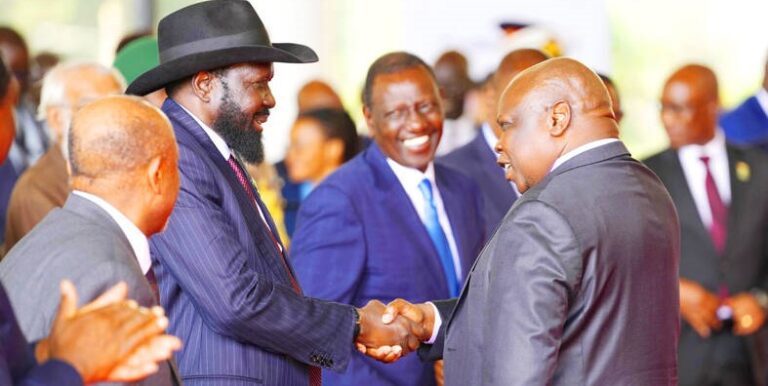Introduction: Are We Moving Toward a Real Solution or Repeating Past Mistakes?
Amid the recurring political crises that have plagued South Sudan since its independence in 2011, numerous peace initiatives have been launched—many of which exist only on paper, failing to translate into tangible outcomes. Today, we find ourselves at yet another crossroads: the Tumaini Peace Talks in Nairobi, which bring together the government and non-signatory opposition groups, including the United People’s Alliance (UPA) led by Pagan Amum.
But the key question remains: Do these talks present a real opportunity to end the conflict, or are they merely another attempt to recycle the crisis within the framework of political interests? Through a deep analysis of the events, I argue that these negotiations hold both opportunities and challenges. However, they also expose the fragility of South Sudan’s political landscape, where stakeholders remain trapped between the legacy of the past and the demands of the future.
Political Context: Why Are We Here Again?
The Failure of the 2018 Revitalized Peace Agreement
The 2018 peace agreement was nothing more than a temporary truce between warring factions. Internal divisions within the government persisted, and most provisions for political and security reforms remained unimplemented. President Salva Kiir and his ruling party continued to dominate the state, while opposition figures—particularly Riek Machar—were marginalized within the transitional government.
In this context, new opposition factions emerged, rejecting the agreement. Among them is the UPA, which argues that the 2018 agreement failed to address the root causes of the crisis and instead reinforced the power of a small elite at the expense of broader political participation.
Why the Tumaini Talks?
The Tumaini Talks were initiated as part of regional and international efforts to end the conflict with non-signatory opposition groups and establish a more inclusive mechanism for integrating these factions into the political process. The participating parties include:
- The Transitional Government of South Sudan, which sees dialogue as a means to contain the opposition and reduce security threats.
- The UPA, which seeks to secure a stronger political role in any future arrangements.
- Other non-signatory factions, such as the National Salvation Front (NAS) led by Thomas Cirillo, which remains skeptical of the government’s intentions.
But are these talks headed in the right direction?
Challenges and Risks: Why the Talks Might Fail
- Deep Disagreements Between the Government and the Opposition
While several protocols have been agreed upon during the negotiations, the government remains reluctant to accept substantial reforms that could reduce its control. The opposition, particularly the UPA, demands a complete restructuring of the state, including fundamental changes to security and political institutions. The government, on the other hand, prefers integrating select opposition figures without making significant concessions, turning the negotiations into a political transaction rather than a genuine reform process.
- The Fragility of the UPA
Although Pagan Amum presents himself as the leader of a new opposition group, his alliance faces internal challenges. Does the UPA have real grassroots support, or is it merely a coalition of former elites seeking to regain lost power? Moreover, how will it navigate its relationship with other armed opposition groups? Many factions remain unwilling to settle politically with the government in Juba.
- The Unclear Position of Regional and International Actors
The Intergovernmental Authority on Development (IGAD), which oversees the 2018 peace deal, still considers that agreement the primary framework for resolving the crisis. This makes any new initiative, such as the Tumaini Talks, questionable. Uganda and Sudan, the two most influential countries in South Sudanese politics, have vested interests in maintaining the current power structure and may resist drastic changes. Meanwhile, the international community is monitoring the situation but has not provided concrete guarantees to enforce any new agreements—a scenario that previously weakened the implementation of the 2018 peace deal.
- Fears of Creating “Parallel Structures”
According to a leaked government document, concerns exist that the Tumaini initiative might lead to the establishment of alternative political structures that could undermine existing institutions. This raises a crucial question: Are these talks truly aimed at promoting peace, or will they create a new front of institutional conflict between the current government and emerging political structures?
Possible Scenarios for the Talks’ Outcome
- Successful Negotiations Leading to a New Agreement
In this scenario, the government and opposition groups reach a revised deal that amends the 2018 agreement and ensures broader political participation. However, this requires strong regional and international commitment, which remains uncertain.
- Prolonged Political Stalemate
The talks may fail to produce concrete results, leaving the status quo intact—where opposition groups continue their political and military activities while the government remains unchallenged.
- Escalation of Conflict and Collapse of Negotiations
If negotiations completely break down, some opposition factions might return to armed struggle, reigniting conflict and further destabilizing the country.
Conclusion: Is Tumaini the Last Chance to Save South Sudan?
As a political analyst, I see the Tumaini Talks as one of many attempts to resolve the conflict, but not necessarily the ultimate or decisive opportunity. The core problem in South Sudan is not the lack of peace negotiations but the absence of genuine political will to implement agreements.
Unless there is a fundamental shift in governance, and unless real solutions replace mere power-sharing deals, any new agreement will be just another chapter in South Sudan’s ongoing cycle of crises. South Sudan does not need another political compromise; it needs deep structural transformation. If these core issues remain unaddressed, then even if Tumaini succeeds, we will likely find ourselves in another peace initiative under a different name, facing the same unresolved problems.
The author, Mahmoud Akot, is a South Sudanese political activist based in France. He can be reached via email: mahmoudakot@gmail.com.
The views expressed in ‘opinion’ articles published by Radio Tamazuj are solely those of the writer. The veracity of any claims made is the responsibility of the author, not Radio Tamazuj.




